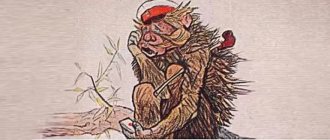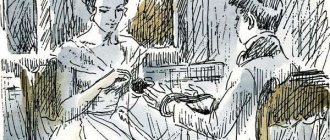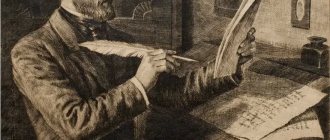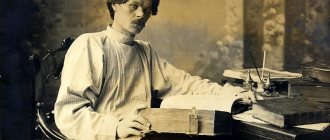Slide captions:
“The Noble Nest” Plot and main characters Completed by: Olga Khinevich and Elena Kovaleva, students 10 “b”. MBOU gymnasium 1, Khabarovsk
The novel takes place in 1842. The noble Kalitin family lives in the provincial town of O. The Kalitin family consists of the mother of the family, Marya Dmitrievna, and her daughters Lisa and Lenochka. 19-year-old Lisa is courted by a successful young official Panshin. One day the Kalitins learn about the return of their relative, Mr. Lavretsky, to Russia. Several years ago, Lavretsky broke up with his wife Varvara after learning about her infidelities. Disappointed in women, Lavretsky loses hope of happiness. After living abroad for several years, he finally comes to his estate in Russia and often visits the Kalitins. Soon Lavretsky falls in love with Lisa. Kalitina. The girl reciprocates his feelings. Suddenly Lavretsky learns from a magazine about the death of his wife Varvara. He understands that, having become a widower, he can marry Lisa. He has hope for happiness. Lisa refuses Panshin, who proposed to her, because she loves Lavretsky. Suddenly, his wife Varvara Pavlovna and her daughter return to Lavretsky from abroad. Varvara allegedly deeply repents and hopes for her husband’s forgiveness. Lavretsky and Lisa understand that they will not be able to get married and that their happiness is destroyed. Lavretsky is forced to live with his wife and daughter, creating the appearance of a family (divorces were almost impossible at that time). Soon, the flighty Varvara Pavlovna again leaves for Paris, where she leads a hectic social life among admirers. This time Lavretsky pays her off with money so that she does not appear in his life again. Having lost hope of happiness with Lavretsky, Lisa goes to a monastery. Lavretsky himself lives on his estate, where he is seriously involved in farming. After 8 years, he visits the monastery where Lisa is. Lavretsky sees her, but the girl pretends not to notice him. Lavretsky leaves.
Turgenev introduces the reader to the main characters of “The Noble Nest” and describes in detail the inhabitants and guests of the house of Marya Dmitrievna Kalitina, the widow of the provincial prosecutor, living in the city of O. with two daughters, the eldest of whom, Lisa, is nineteen years old. More often than others, Marya Dmitrievna visits St. Petersburg official Vladimir Nikolaevich Panshin, who ended up in the provincial city on official business. Panshin is young, dexterous, moves up the career ladder with incredible speed, while he sings well, draws and looks after Liza Kalitina
The main character of the novel, Fyodor Ivanovich Lavretsky, has many similarities with Turgenev himself. He is honest, sincerely loves his homeland, and seeks rational use of his abilities. Raised by a power-hungry and cruel aunt, and then according to the peculiar “Spartan system” of his father, he acquired good health and a stern appearance, but a kind and shy character. Lavretsky finds it difficult to communicate. He himself feels the gaps in his upbringing and education, so he strives to correct them. The calculating Varvara sees in Lavretsky only a stupid bumpkin whose wealth is easy to take possession of. The sincerity and purity of the hero's first real feeling is shattered by his wife's betrayal. As a result, Fyodor stops trusting people, despises women, and considers himself unworthy of true love. Having met Lisa Kalitina, he does not immediately decide to believe in the purity and nobility of the girl. But, having recognized her soul, he believed and fell in love with her for the rest of his life.
Lisa's character was formed under the influence of an Old Believers nanny. From childhood, the girl was sensitive to religion; “the image of the omnipresent, all-knowing God was forced into her soul with some sweet power.” However, Lisa behaves too independently and openly for her time. In the nineteenth century, girls who wanted to get married successfully were much more docile than Turgenev’s heroine. The climax of the novel is Lavretsky’s dispute with Panshin about the people and the subsequent scene of Lisa’s explanation with Fyodor. In the male conflict, Panshin expresses the opinion of an official with pro-Western views, and Lavretsky speaks from positions close to Slavophilism. It was during this argument that Lisa realizes how consonant her thoughts and judgments are with Lavretsky’s views, and realizes her love for him.
Among the “Turgenev girls”, the image of Liza Kalitina is one of the most vivid and poetic. Her decision to become a nun is based not only on religiosity. Lisa cannot live contrary to her moral principles. In the current situation, there was simply no other way out for a woman of her circle and spiritual development. Lisa sacrifices her personal happiness and the happiness of her loved one because she cannot do “wrong.” Lisa is being courted by a young man, a metropolitan official with a wonderful future. Lisa's mother would be happy to give her in marriage to him; she considers this a wonderful match for Lisa. But Liza cannot love him, she feels the falseness in his attitude towards her, Panshin is a superficial person, he values \u200b\u200bthe external shine in people, not the depth of feelings.
There are also representatives of the people in the novel. Unlike the gentlemen, serfs and poor people are depicted by Turgenev with sympathy and sympathy. The ruined destinies of Malasha and Agafya, Lemm’s talent that was never revealed due to poverty, and many other victims of the lord’s tyranny prove that the history of the “noble nests” is far from ideal. And the writer considers serfdom to be the main reason for the ongoing social collapse, which corrupts some and reduces others to the level of dumb creatures, but cripples everyone.
Summary
I
On a quiet spring evening in the provincial town of O., the fifty-year-old widow Marya Dmitrievna Kalitina and the sister of her late husband, the old woman Marfa Timofeevna Pestova, are sitting in the same house. The women start talking about their regular guest, Sergei Petrovich Gedeonovsky. Marfa Timofeevna speaks disapprovingly of him.
Soon Sergei Petrovich himself appears on the street. A little later the servant reports his arrival.
II
Gedeonovsky is in a hurry to share important news: Fyodor Ivanovich Lavretsky has returned to the city. Sergei Petrovich is surprised how he dared to appear in the world. Marfa Timofeevna declares that it is not Fedya who is to blame for what happened, but his dissolute wife.
After the old woman leaves, Gedeonovsky says that Lavretsky’s wife now lives in Italy. Kalitina is very interested in all this, because Fyodor Ivanovich is her great-nephew.
A little girl runs in (Kalitina’s youngest daughter Lena) and reports the arrival of Vladimir Nikolaevich Panshin.
III
Panshin shows the owner his purchase - a beautiful horse. Soon he enters the living room. Following him, Marya Dmitrievna’s eldest daughter, Lisa, appears.
IV
Vladimir Nikolaevich is a twenty-eight-year-old St. Petersburg official who shows great promise. Despite relative poverty, this young man is considered “one of the people” in the highest circles of society. Panshin came to O. on official business and immediately became a frequent and welcome guest in the Kalitins’ house.
After a few pleasantries, Vladimir Nikolaevich sits down at the piano and performs a romance of his own composition. Everyone present praises the amateur.
Soon the music teacher, Christopher Fedorovich Lemm, enters the living room. He avoids communicating with Panshin and takes Lena to a music lesson. Marya Dmitrievna invites Gedeonovsky to take a walk in the garden. Lisa and Vladimir Nikolaevich are left alone.
V
Music teacher Lemm was born in Germany. As a child, he learned to play various instruments. The boy's parents died when he was eight years old. Soon Lemm began to earn his living through music and gradually achieved a position as a conductor in the orchestra.
At twenty-eight years old, Lemm moved to Russia in the hope of achieving fame and recognition as a great composer. The German musician was unlucky. He endured many troubles and hardships, changed several places and eventually ended up in the city of O, where he began giving paid music lessons.
Lemm was about fifty years old. He had long ago abandoned dreams of fame as a composer, but in honor of Lisa he composed a cantata. The German was upset that the girl showed this essay to the amateur Panshin.
VI
Lisa and Panshin try to play a Beethoven sonata four hands. Vladimir Nikolaevich constantly gets confused and offers to teach the girl how to draw instead.
After finishing his lesson with Lena, Lemm goes home. Lisa catches up with him and apologizes for the misunderstanding with the cantata. At this time, some unfamiliar gentleman approaches the house.
VII
The guest introduces himself as Lavretsky. He remembers that he met Lisa when she was still a little girl.
The owner of the house and Gedeonovsky had already returned from their walk. Marya Dmitrievna is noticeably embarrassed when meeting Fyodor Ivanovich and does not know what to talk to him about, maintaining delicacy.
Marfa Timofeevna behaves completely differently. The old woman happily greets her beloved Fedya and bombards him with questions. Lavretsky says that he intends to settle in the small village of Vasilyevskoye.
The guests leave late in the evening. When parting, Panshin privately hints to Lisa the main reason why he visits the Kalitins’ house: “You know who attracts me here...”.
VIII
Fyodor Ivanovich belonged to a very ancient Lavretsky family. His great-grandfather achieved significant influence and wealth, his grandfather (Petr Andreevich) led the ordinary life of a Russian gentleman, and his father, Ivan Petrovich, was educated and raised in a European way.
To spite his stern father, Ivan Petrovich married a simple peasant woman, Malanya. From this “shameful” relationship Fyodor Ivanovich was born.
IX
At the request of his dying wife, Pyotr Andreevich forgave his unlucky son and accepted Malanya and young Fedya into his home. Ivan Petrovich himself went abroad and spent several years there. He returned to his homeland only in 1812, took part in the war and again went on a trip abroad.
Fedya's grandfather and mother died. His aunt, Glafira Petrovna, was involved in his upbringing. When the boy was twelve years old, she wrote a letter to Ivan Petrovich with an insistent request to return and take care of the household and the only heir.
X
Ivan Petrovich returned to his native estate. His long life abroad changed him greatly. Ivan Petrovich became a passionate admirer of English orders and customs. He began extensive “reforms” on his estate. However, innovations appeared only externally: liveries for servants, foreign wines instead of vodka, etc. Farming continued as before, but the life of the peasants became even harder.
Ivan Petrovich's main concern was raising his son.
XI
Until his father returned, his aunt kept Fedya very strictly. He sat locked up all day, and for “entertainment” he looked at an incomprehensible book with pictures, “Symbols and Emblems.” The boy was educated by a hired Swedish woman who “somehow played the piano.”
Ivan Petrovich applied a special “system” to his twelve-year-old son, where the main role was given to physical exercise. The boy began to intensively engage in gymnastics, horse riding, and crossbow shooting. New teachers taught Fedya natural sciences, mathematics, and law.
After the Decembrist uprising, Ivan Petrovich's views changed dramatically. He abandoned “Anglomanism” and began to adhere to Russian customs.
Suddenly, Ivan Petrovich went blind. After unsuccessful attempts to recover, he took to his bed and tormented people with whining and complaints for a long time until he died.
Fedya, meanwhile, was already twenty-three years old.
XII
His peculiar upbringing made Fyodor Ivanovich a very reserved and timid person. He had great knowledge, but did not know how to “get along” with people and was afraid of women.
Lavretsky went to Moscow and entered the university. He became friends with only one fellow student - Mikhalevich.
One day in the theater Fyodor Ivanovich saw a girl who amazed him with her beauty. Mikhalevich told his friend that the beauty’s name was Varvara Pavlovna Korobyina, and offered his mediation for acquaintance.
XIII
Varvara Pavlovna was nineteen years old. She was the daughter of a retired general and had recently graduated from college. The Korobin family was poor, but the general was well known and accepted in high society.
XIV
Fyodor Ivanovich was well received by the Korobin family and became a frequent guest in their house. Six months later, he made Varvara Pavlovna an offer, which was immediately accepted. The girl's parents knew very well about the groom's great fortune.
XV
At the insistence of the Korobins, Lavretsky abandoned his studies and returned with his young wife to the family estate in Lavriki. Gradually, Varvara Pavlovna took control of the entire household, and then transferred control to her father.
The family moved to St. Petersburg, where Varvara Pavlovna began to organize evenings, gathering the “cream” of high society. She gave birth to her husband's son, but the boy did not live long. To improve his wife’s health, Fyodor Ivanovich took her abroad.
The couple stopped in Paris, where the name of the “charming Madame Lavretskaya” soon became widely known. Guests constantly gathered in her “salon”.
Fyodor Ivanovich did not like the wide high society life. He dreamed of returning to a quiet family estate.
XVI
One day, Fyodor Ivanovich accidentally found a love note to his wife from a frequent guest - a young, stupid Frenchman. He flew into a rage, left the apartment and sent Varvara Pavlovna a letter. Lavretsky did not want to meet with his unfaithful wife anymore, but gave her a large allowance.
Fyodor Ivanovich moved to Italy, but for a long time he collected information about his wife. She finally became entangled in love affairs and became “famous.” Varvara Pavlovna had a daughter.
Four years later, Lavretsky decided to return to his homeland.
XVII
The next morning after his first visit to the Kalitins’ house, Lavretsky comes to say goodbye before leaving for the village. He meets Lisa, who is going to church for early mass.
Marya Dmitrievna hints to Lavretsky that she considers Panshin a suitable groom for her daughter. Marfa Timofeevna speaks negatively about the young man and claims that he is unworthy to be Lisa’s husband.
XVIII
Lavretsky travels to Vasilyevskoye and on the road thinks about Lisa and her possible marriage to Panshin. Having driven away “stupid dreams”, he indulges in memories with pleasure and looks forward to the long-awaited return to his native village.
XIX
Fyodor Ivanovich finds the manor house in Vasilyevskoye in extreme desolation. He is met by several decrepit servants who are somehow preparing dinner for the master. No one expected that Lavretsky would settle in a remote village, not wanting to return to the beautiful estate in Lavriki.
XX
Lavretsky succumbs to the charm of a calm village life. He thinks with regret about the years wasted on “women’s love.”
XXI
Within two weeks, Fyodor Ivanovich puts the house in order and transports the necessary things from Lavriki. He does housework, reads a lot, listens to old man Anton's stories about the past.
Three weeks later, Lavretsky goes to O. to visit the Kalitins. He spends the whole evening with them and gets to know Lemm closely. Fyodor Ivanovich likes the old German. He invites the unfortunate musician to his place and a few days later takes him to Vasilyevskoye.
XXII
On the road, Lavretsky and Lemm talk about music, love and Lisa. Arriving in Vasilievskoye, both could not fall asleep for a long time. Fyodor Ivanovich remembers the “pure girl,” and Lemm unsuccessfully waits for inspiration, the approach of which he felt in the conversation.
XXIII
The next day, over tea, new friends talk about Lisa and her proposed marriage to Panshin. Lemm states that this is a girl with “exalted feelings,” so she cannot love a self-confident “dilettante.” Lavretsky offers to invite Liza, along with her mother and Marfa Timofeevna, to Vasilyevskoye.
XXIV
Two days later, Fyodor Ivanovich comes to the Kalitins and invites them to his place. Marfa Timofeevna, citing old age, refuses. Marya Dmitrievna mentions Panshin, but Lavretsky gently hints that he does not want to include him among the guests.
Before the invitation, Fyodor Ivanovich talks alone with Lisa. The girl asks him to forgive his unfaithful wife. She is convinced: one cannot “separate what God has united.”
XXV
Returning to Vasilyevskoye, Lavretsky welcomes a new guest at home - Mikhalevich. Old friends argue fiercely all night on a variety of lofty topics. Mihalevich is very poor, but remains a convinced idealist who believes in goodness and progress. The next day he leaves.
XXVI
Two days later the Kalitins arrive in the village. After lunch everyone goes fishing. At the river, Lavretsky is left alone with Lisa and asks her opinion about Panshin. The girl replies that he is a very good person with a “kind heart.” Fyodor Ivanovich does not agree with this characterization. He believes that Vladimir Nikolaevich “has no heart... and no.”
The conversation turns to life, about faith in God. Lavretsky understands that Lisa is very religious.
XXVII
Having seen off the guests, Fyodor Ivanovich happily recalls all the details of the happy day spent in Lisa’s company. He feels that his wife’s betrayal does not mean the end of his life.
The next day, while looking through the foreign press, Lavretsky comes across a message about the death of his wife.
XXVIII
Fyodor Ivanovich takes Lemm back to the city and stops by to see the Kalitins. There he finds several guests, whose company is extremely unpleasant for him. Having waited for the right moment, Lavretsky gives Lisa a magazine with a note about the sudden death of Madame de Lavretzki. He asks the girl not to tell anyone about this.
XXIX
The next morning, Lavretsky and Lisa meet in the garden. The girl is amazed by the message. She claims that Lavretsky must receive forgiveness from God.
Fyodor Ivanovich says that the death of his wife gives him long-awaited freedom. He hints at the emergence of hope for happiness, since he met a “pure female soul.”
Lisa is noticeably embarrassed. She admits that she received a letter from Panshin with a marriage proposal. Lavretsky convinces her to “listen to her heart” and not to her mother’s advice. A “marriage for reason” with an unloved person will not bring her happiness.
XXX
In the evening, Lavretsky again comes to the Kalitins and finds Panshin with them, who is playing cards with Marya Dmitrievna with an important air. Liza privately tells Lavretsky that she did not give a final answer and asked Vladimir Nikolaevich to wait.
XXXI
Lavretsky realizes that he has fallen in love with Lisa. He returns to the village, but cannot languish in separation and on the fourth day he comes to the city again.
Lisa admits that she is almost ready to refuse Panshin. Fyodor Ivanovich comes to church with her for mass and after the service he experiences a joyful feeling of purification and the possibility of happiness.
XXXII
For several days Lavretsky experiences suffering. He greedily looks through the latest magazines and newspapers, hoping to find confirmation of the report of his wife's death.
Lisa avoids communicating with Fyodor Ivanovich. A painful struggle is going on in her soul. The girl still has not given an answer to Panshin.
XXXIII
One evening at the Kalitins’, a dispute starts between Lavretsky and Panshin about the future of the country. Fyodor Ivanovich argues that Russia is following its own unique path; you need to “recognize the people’s truth and humble yourself before it.” Vladimir Nikolaevich declares that Russia needs to be completely remade according to the European model. He assigns the main role to “serving people,” among whom he counts himself. The hostess is delighted with Panshin's speech.
Lavretsky’s opinion is completely shared by Marfa Timofeevna and Lisa. The three of them sit next to each other, as if separating themselves from Marya Dmitrievna and the self-confident Vladimir Nikolaevich.
XXXIV
The dispute brings Lisa closer to Lavretsky. The girl feels how dear the patriotic thoughts of Fyodor Ivanovich are to her. His only “minus” is his indifferent attitude towards God.
The guests say goodbye and leave. Dreaming, Lavretsky wanders aimlessly around the city and unconsciously returns to the Kalitins’ garden. Suddenly Lisa comes out of the house.
Fyodor Ivanovich takes the girl to the bench and fervently confesses his love to her. Lisa responds to his timid kiss.
Returning home, happy Lavretsky walks through the city at night and suddenly hears some beautiful music. The sounds come from a small house. In response to Lavretsky’s screams, Lemm appears at the window. The musician invites him to his place and repeats a wonderful melody of his own composition. He claims that he created it because he “knows everything.”
XXXV
Lisa’s extreme religiosity is explained by the fact that from the age of five the girl was raised by the pious nanny Agafya Vlasyevna. The old woman constantly took her to church, told her about the lives of the saints and firmly established her in the faith. Lisa “loved God alone enthusiastically, timidly, tenderly.” She didn’t even think about loving a man before meeting Lavretsky.
XXXVI
The next day, in front of the Kalitins’ house, Lavretsky meets Panshin, who pretends not to notice him. The servant reports that the mistress is resting. Fyodor Ivanovich arrives later, but is again not accepted.
Lavretsky returns to the village, but in the evening he goes back to the city, where he has been renting a house for some time. His “resurrected” wife is waiting for him there.
Varvara Pavlovna in tears asks her husband for forgiveness. To pity him, she shows her child - a beautiful girl Adochka.
Fyodor Ivanovich listens to his wife with irritation. He does not at all believe the repentance of the deceitful woman and leaves the house in anger.
XXXVII
For a couple of hours, Lavretsky walks around the city and thinks angrily about the unexpected “resurrection” of his wife, which deprives him of Lisa. He then goes to Lemm and asks to spend the night. Fyodor Ivanovich tells the old man about everything and instructs him to give Lisa a note in which he informs about the return of Varvara Pavlovna. In the morning, Lemm goes to the Kalitins for a lesson and brings an answer. The girl agrees to meet and discuss everything the next evening.
Lavretsky comes home. Having difficulty containing his anger, he tells his wife that he is putting the estate in Lavriki at her disposal. He demands that his wife go there as quickly as possible and no longer seek meetings with him.
After her husband leaves, Varvara Pavlovna goes to the Kalitins.
XXXVIII
The next day after the mutual declaration of love, Liza refuses Panshin. Having learned about this, Marya Dmitrievna brings her “ungrateful” daughter to tears, reproaching her for this refusal.
Then Marfa Timofeevna, who learned from the servants about the night date, “pounces” on Lisa. The girl confesses to the old woman that she loves Fyodor Ivanovich. There is nothing criminal in this, since there is information that Varvara Pavlovna died.
XXXIX
The richly dressed beauty Lavretskaya makes a great impression on Marya Dmitrievna. The cunning woman very skillfully plays the role of a repentant wife. She literally captivates Liza’s mother and Gedeonovsky, who came to visit, with her sophistication of manners and stories from high society life.
Lisa has already received Lavretsky’s note. She goes out to look at her “resurrected” wife, feeling guilty towards her. Varvara Pavlovna, as usual, “shines.” She sits down at the piano and performs several pieces.
After lunch, Liza says that she has a headache and goes to Marfa Timofeevna. The old woman hugs the girl, mourning with her the collapse of all hopes.
XL
Panshin comes to the Kalitins. Experienced Varvara Pavlovna immediately captures the young man’s attention and captivates him with her beauty and grace. The couple sits down at the piano and performs several arias in two voices. The “divorced” Lavretskaya even briefly forgets that she must play the role of an unhappy wife.
Before the guests leave, Marya Dmitrievna promises Lavretskaya to try to reconcile her with her husband.
XLI
Lavretsky returns to Vasilyevskoye in despair. The servants immediately notice that the master is oppressed by some kind of grief. Fyodor Ivanovich, in anguish, cannot find a place for himself. The next day he goes to the city to meet with Lisa.
XLII
Lavretsky drives into his town house and finds out that his wife is visiting the Kalitins. He waits for her return for a while, and then goes there himself. Fyodor Ivanovich does not want to see his wife in front of strangers, so he secretly goes into Marfa Timofeevna’s room.
The old woman greets Lavretsky with sympathy. She sends for Lisa, and then, as if by chance, leaves the lovers alone. The girl says goodbye to her beloved and says that they both have to fulfill their duty to God. Lavretsky’s task is to forgive his wife and make peace with her. Lisa is silent about her commitment.
After farewell, Fyodor Ivanovich is stopped at the gate by a footman and conveys the hostess’ request to “come” to her.
XLIII
Lavretsky returns to the house in bewilderment. Marya Dmitrievna talks for a long time about Varvara Pavlovna’s sincere repentance and the need to forgive her. After crying, she leads her out from behind the screen.
Fyodor Ivanovich is outraged by the “theatrical” nature of the situation. He firmly states that the whole scene was caused by his wife. Lavretsky really cannot understand what she wants from him. In the end, he agrees to create for the world the appearance of restoring marital relations, but on one condition: Varvara Pavlovna will live in Lavriki. Her departure from the estate removes all promises from her husband.
XLIV
The next morning, Lavretsky comes to church and finds Lisa there. He tries to see the girl off, but she says that they shouldn’t see each other again. Lisa vaguely hints that all people are now very far from her.
On the way home, Fyodor Ivanovich meets Lemm, who gloomily says: “Everyone died, and we died.”
Lavretsky, along with his wife and daughter, moves to Lavriki, but a week later he goes to Moscow. In his absence, Panshin becomes Varvara Pavlovna’s regular guest...
XLV
Returning home, Lisa confesses to Marfa Timofeevna that she has made a firm decision to go to the monastery. No amount of persuasion from the frightened old woman helps. The girl only agrees to postpone the final decision for six months.
With the onset of winter, Varvara Pavlovna, despite her promise not to leave Lavriki, moves to St. Petersburg, where Panshin is already waiting for her.
In the spring, Lavretsky learns that Lisa took monastic vows in some distant monastery.
Epilogue
Eight years pass. Varvara Pavlovna lives in Paris, surrounded by a crowd of admirers. Her daughter will most likely have to repeat her mother's turbulent life. Panshin achieved a significant promotion. Marfa Timofeevna and Marya Dmitrievna died shortly after Lisa left for the monastery.
The aged Lavretsky arrives at the Kalitins' house. He is joyfully greeted by the youth, led by the matured Lena. Young people talk about their lives, about the news that they occasionally receive about Lisa.
Lavretsky sadly walks around the places dear to his heart: the garden; the bench on which he confessed his love to Lisa; living room, where he often spent his evenings. He sincerely wishes happiness to the new generation and admits without regret that his life has passed: “Hello, lonely old age!”
They say that Fyodor Ivanovich went to a distant monastery. Lisa walked past him and only with a faint trembling of her eyelashes showed that she recognized her beloved. No one can know what they both thought at that moment and what they felt in their hearts.
The image and characterization of Lavretsky in the novel “The Noble Nest” by Turgenev: description in quotes
Mr. Lavretsky is one of the central characters in the novel “The Noble Nest” by Turgenev.
The image and characterization of Lavretsky in the novel “The Noble Nest” by Turgenev: description in quotes
The full name of the hero is Fyodor Ivanovich Lavretsky: “. Fyodor Ivanovich Lavretsky has arrived.”
Lavretsky is a hereditary nobleman, a wealthy landowner:
“Fyodor Ivanovich Lavretsky (we must ask the reader for permission to interrupt the thread of our story for a while) came from an old noble tribe.” ". Varvara Pavlovna was well aware that her fiancé was rich. " ".
Should a rich landowner, at twenty-six, take lessons like a schoolboy?” (about young Lavretsky) Lavretsky is the great-nephew of another heroine of the novel, Marya Dmitrievna Kalitina (Lisa’s mother):
“.
Marya Dmitrievna spoke. “It’s like a family, because he, Sergei Petrovich, you know, is my great-nephew.” Lavretsky is 35 years old (when he falls in love with Lisa Kalitina).
Lavretsky was born on August 20, 1807: “Really,” he thought, “at thirty-five years old I have nothing else to do but again give my soul into the hands of a woman?” “The good landowner congratulated Ivan Petrovich on the birth of his son, who was born in the village of Pokrovskoye on August 20, 1807 and named Fedor in honor of the holy martyr Theodore Stratilates.”
Lavretsky’s mother, Malanya, was a simple peasant woman, and her father was a hereditary nobleman:
“It so happened that among Anna Pavlovna’s maids there was one very pretty girl, with clear, gentle eyes and delicate features, named Malanya, a smart and modest girl.
Ivan Petrovich liked her from the first time; and he loved her. “(about Lavretsky’s parents) The following is known about the appearance of 35-year-old Lavretsky:
“. Some gentleman he didn’t know came in, wearing a gray coat and a wide straw hat.” “Lavretsky really did not look like a victim of fate. His red-cheeked, purely Russian face, with a large white forehead, a slightly thick nose and wide, regular lips, exuded steppe health, strong, durable strength. He was beautifully built, and his blond hair curled on his head like a young man’s. In his eyes alone, blue, bulging, and somewhat motionless, one could notice either thoughtfulness or fatigue, and his voice sounded somehow too even.” ".
and you, Fedyusha, give me your hand. ABOUT! Yes, how fat she is!” The following is known about the appearance of young Lavretsky:
“Healthy, red-cheeked, already with an overgrown beard, silent, he made a strange impression on his comrades; They did not suspect that in this stern husband, who carefully came to lectures in a wide village sleigh as a couple, there was almost a child hidden.” (Lavretsky at the age of 23) “It was strange to see his powerful, broad-shouldered figure, always bent over his desk, his full, hairy, ruddy face, half covered with sheets of a dictionary or notebook.” (Lavretsky aged about 26)
An excerpt characterizing the Noble Nest
Only this doubt often occurred to Pierre. He also didn’t make any plans now. The impending happiness seemed so incredible to him that as soon as it happened, nothing could happen. It was all over. A joyful, unexpected madness, of which Pierre considered himself incapable, took possession of him. The whole meaning of life, not for him alone, but for the whole world, seemed to him to lie only in his love and in the possibility of her love for him. Sometimes all the people seemed to him to be occupied with only one thing - his future happiness. It sometimes seemed to him that they were all as happy as he was, and were only trying to hide this joy, pretending to be busy with other interests. In every word and movement he saw hints of his happiness. He often surprised people who met him with his significant, happy looks and smiles that expressed secret agreement. But when he realized that people might not know about his happiness, he felt sorry for them with all his heart and felt a desire to somehow explain to them that everything they were doing was complete nonsense and trifles, not worth attention. When he was offered to serve or when they discussed some general, state affairs and war, assuming that the happiness of all people depended on this or that outcome of such and such an event, he listened with a meek, sympathetic smile and surprised the people who spoke to him with his strange remarks. But both those people who seemed to Pierre to understand the real meaning of life, that is, his feeling, and those unfortunate ones who obviously did not understand this - all people during this period of time seemed to him in such a bright light of the feeling shining in him that without the slightest effort, he immediately, meeting any person, saw in him everything that was good and worthy of love. Looking at the affairs and papers of his late wife, he did not feel any feeling for her memory, except pity that she did not know the happiness that he knew now. Prince Vasily, now especially proud of receiving a new place and star, seemed to him a touching, kind and pitiful old man. Pierre often later recalled this time of happy madness. All the judgments that he made about people and circumstances during this period of time remained true for him forever. He not only did not subsequently renounce these views on people and things, but, on the contrary, in internal doubts and contradictions he resorted to the view that he had at this time of madness, and this view always turned out to be correct. “Perhaps,” he thought, “I seemed strange and funny then; but I was not as mad then as it seemed. On the contrary, I was then smarter and more insightful than ever, and I understood everything that is worth understanding in life, because ... I was happy.” Pierre's madness consisted in the fact that he did not wait, as before, for personal reasons, which he called the merits of people, in order to love them, but love filled his heart, and he, loving people for no reason, found undoubted reasons for which it was worth loving their. From that first evening, when Natasha, after Pierre's departure, told Princess Marya with a joyfully mocking smile that he was definitely, well, definitely from the bathhouse, and in a frock coat, and with a haircut, from that moment something hidden and unknown to her, but irresistible, awoke in Natasha's soul. Everything: her face, her gait, her gaze, her voice - everything suddenly changed in her. Unexpected for her, the power of life and hopes for happiness surfaced and demanded satisfaction. From the first evening, Natasha seemed to have forgotten everything that had happened to her. Since then, she never once complained about her situation, didn’t say a single word about the past and was no longer afraid to make cheerful plans for the future. She spoke little about Pierre, but when Princess Marya mentioned him, a long-extinguished sparkle lit up in her eyes and her lips wrinkled with a strange smile. The change that took place in Natasha at first surprised Princess Marya; but when she understood its meaning, this change upset her. “Did she really love her brother so little that she could forget him so quickly,” thought Princess Marya when she alone pondered the change that had taken place. But when she was with Natasha, she was not angry with her and did not reproach her. The awakened force of life that gripped Natasha was obviously so uncontrollable, so unexpected for her that Princess Marya, in Natasha’s presence, felt that she had no right to reproach her even in her soul. Natasha gave herself over to the new feeling with such completeness and sincerity that she did not try to hide the fact that she was no longer sad, but joyful and cheerful. When, after a nightly explanation with Pierre, Princess Marya returned to her room, Natasha met her on the threshold. - He said? Yes? He said? – she repeated. Both a joyful and at the same time pitiful expression, asking for forgiveness for her joy, settled on Natasha’s face. – I wanted to listen at the door; but I knew what you would tell me. No matter how understandable, no matter how touching the look with which Natasha looked at her was for Princess Marya; no matter how sorry she was to see her excitement; but Natasha’s words at first offended Princess Marya. She remembered her brother, his love. “But what can we do? she cannot do otherwise,” thought Princess Marya; and with a sad and somewhat stern face she told Natasha everything that Pierre had told her. Hearing that he was going to St. Petersburg, Natasha was amazed. - To St. Petersburg? – she repeated, as if not understanding. But, looking at the sad expression on Princess Marya’s face, she guessed the reason for her sadness and suddenly began to cry. “Marie,” she said, “teach me what to do.” I'm afraid of being bad. Whatever you say, I will do; teach me... - Do you love him? “Yes,” Natasha whispered. -What are you crying about? “I’m happy for you,” said Princess Marya, having completely forgiven Natasha’s joy for these tears. – It won’t be soon, someday. Think about what happiness it will be when I become his wife and you marry Nicolas. – Natasha, I asked you not to talk about this. We'll talk about you. They were silent. - But why go to St. Petersburg! - Natasha suddenly said, and she quickly answered herself: - No, no, this is how it should be... Yes, Marie? This is how it should be...
History of creation
“The Noble Nest” was conceived at the beginning of 1856, but a difficult stage in his personal life and health status interfered with the writer’s plans. In the summer of the same year, I. Turgenev left Russia and spent about two years abroad. In fact, it was then that the breakdown of his long-term relationship with Pauline Viardot began, which resulted in a feeling of loneliness and restlessness. The writer was experiencing an age-related crisis, which he felt as the approach of old age, and suffered from the inability to start a family, which affected his health and creative impotence.
During this period, significant events took place in the social life of Russia, and although the action in “The Noble Nest” dates back to 1842, i.e., to a different era, I. Turgenev’s discussions of these problems in correspondence and personally with his friends and writers were reflected in the events described in the novel. These include:
- Death of Nicholas I.
- Shock from defeat in the Crimean War.
- The need for many reforms and, most importantly, the abolition of serfdom.
- The growing role of the noble intelligentsia in the public life.
The first plans and notes for the novel have not reached our time and it is not known how the work was originally intended.
The author began to write The Noble Nest in earnest only in June 1858, upon his return to Russia. First, readings of the novel were carried out in a narrow circle, and it became available to the general public after its publication in the Sovremennik magazine in 1859.
Film adaptations
| "Nobles' Nest" on Wikiquote |
| "Nobles' Nest" on Wikisource |
The novel was filmed in 1915 by V. R. Gardin and in 1969 by Andrei Konchalovsky. In the Soviet film, the main roles were played by Leonid Kulagin and Irina Kupchenko. See Nobles' Nest (film).
- In 1965, a television film based on the novel was made in Yugoslavia. Directed by Daniel Marusic.
- In 1969, a film was made on GDR television based on the novel by I.S. Turgenev. Directed by Hans-Erik Korbschmidt.
Plot retelling
On the title page of the first edition of the book the word “story” was written, as the author himself designated the genre, but in this work the destinies of individual people are so closely intertwined with social and national life that it is classified as a socio-philosophical novel.
Characters
The main characters of “The Noble Nest” are 35-year-old wealthy landowner Fyodor Ivanovich Lavretsky and 19-year-old young noblewoman Elizaveta Mikhailovna Kalitina. Lavretsky is an honest and decent man who most of all wanted personal happiness with the woman he loved. Lisa is not a very educated provincial girl, but her pure and kind nature is very attractive to others. The girl puts duty above any feelings and aspirations. Other characters:
- Varvara Pavlovna is Lavretsky’s wife.
- Marya Dmitrievna Kalitina is Lisa's mother.
- Marfa Timofeevna Pestova is Liza’s maternal great-aunt.
- Sergei Petrovich Gedeonovsky - serves as a state councilor and often visits the Kalitins.
- Vladimir Nikolaevich Panshin is a promising official, an attractive young man who shows attention to Lisa.
- Christopher Fedorovich Lemm is an old German who serves as a music teacher for the Kalitins.
Nanny Agafya played a big role in Lisa’s fate, instilling in her religiosity and belief in mysticism. Panshin, for all his external attractiveness and talents, is a selfish person and has his own mind. Having received a refusal from Lisa, he immediately switches to Varvara Pavlovna.
The image of an old music teacher is interesting. Lemm faced a difficult fate: he lost his parents early and wandered for a long time, and his talent as a composer did not receive recognition. But this outwardly scary person is distinguished by his kindness and has a keen sense of beauty.
Summary
The events of the novel take place in the provincial town of O., where the Kalitin family lives. The mother of the family is a widow of noble origin; her aunt and daughters Lisa and Lena live with her. A young official, Pashnin, enters the Kalitins’ house and takes care of Liza. This is a brilliant young man who arrived in O. for work. He himself writes and performs romances, which are liked by society, but are not recognized by the old music teacher Lemm. He finds his work strange and false.
One day, a family friend Gedeonsky reports that Fyodor Lavretsky, a distant relative of the Kalitins, returned to his homeland due to troubles with his wife. Varvara’s infidelities have led to the man feeling unhappy and not trusting women. One day, while seeing Lemm off after class, Lisa meets a stately man at the gate, who turns out to be Lavretsky. Marya Dmitrievna is glad to see him and invites him to visit the Kalitins more often. Pashnin confesses his love to Lisa and asks her to marry him, she promises to think about it.
Fyodor settles in his Vasilievskoye estate, because in Lavriki he lived with Varvara and everything there reminds him of his lost happiness. Communicating with Lisa, the man becomes more and more impressed by her inner purity and falls in love with the girl. When the young people explain themselves, Lisa admits that she experiences reciprocal feelings. But Lavretsky is married and she, with her beliefs about duty, does not believe in a happy future for them. Hope appears when Fyodor came across a note in a magazine about the death of his wife, and Lisa did not accept Panshin’s offer. Being a widower, a man could marry his beloved.
Main characters of the novel
Main characters:
- Lavretsky Fyodor Ivanovich is a rich landowner, an honest and decent person.
- Varvara Pavlovna is Lavretsky’s wife, a two-faced and calculating person.
- Lisa Kalitina is the eldest daughter of Marya Dmitrievna, a pure and deeply decent girl.
Other characters:
- Marya Dmitrievna Kalitina is a widow, a sensitive woman.
- Marfa Timofeevna Pestova is Maria Dmitrievna’s own aunt, an honest and independent woman.
- Lena Kalitina is the youngest daughter of Marya Dmitrievna.
- Sergei Petrovich Gedeonovsky - state councilor, friend of the Kalitin family
- Vladimir Nikolaevich Panshin is a handsome young man, an official.
- Christopher Fedorovich Lemm is an old music teacher of the Kalitin sisters, a German.
- Ada is the daughter of Varvara Pavlovna and Fyodor Ivanovich.








